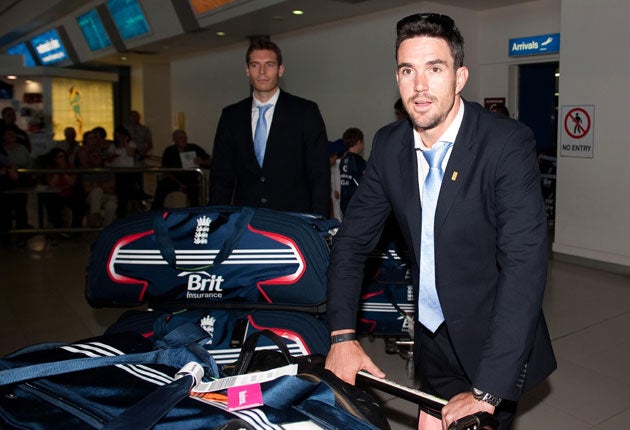Straight bats fend off Aussie media's grenades

Your support helps us to tell the story
From reproductive rights to climate change to Big Tech, The Independent is on the ground when the story is developing. Whether it's investigating the financials of Elon Musk's pro-Trump PAC or producing our latest documentary, 'The A Word', which shines a light on the American women fighting for reproductive rights, we know how important it is to parse out the facts from the messaging.
At such a critical moment in US history, we need reporters on the ground. Your donation allows us to keep sending journalists to speak to both sides of the story.
The Independent is trusted by Americans across the entire political spectrum. And unlike many other quality news outlets, we choose not to lock Americans out of our reporting and analysis with paywalls. We believe quality journalism should be available to everyone, paid for by those who can afford it.
Your support makes all the difference.The traditional pre-Ashes war of words may be playing out behind the scenes as former Australia and England opponents air their patriotic views, but Andrew Strauss is having little of the verbal jousting.
During the 2009 Ashes, Strauss said Australia had lost their aura, sensing that the baggy-green buccaneers of old had given way to journeymen uncomfortable with the task of extending two decades of dominance. But he has no interest in re-engaging in Ashes theatrics.
"I'm not sure it's too wise to get involved in that matter again," Strauss said after landing in Perth yesterday to start an Ashes series that will define the legacy of his own captaincy and that of his opposite number, Ricky Ponting.
If Australia had lost their aura in 2009, where do they stand after losing three consecutive Tests for the first time in a lifetime? "The Australian side doesn't have the very experienced legendary players it once had but they have some very good players and at home they will be a very strong side," Strauss said. "For us to expect Australia to be any less competitive than they have been in every other series out here would be a bad way of playing things."
Strauss was poised, confident, full of good cheer and well-rehearsed words when he arrived. There was certainly no hint of Douglas Jardine's churlishness when he blazed the same trail 78 years earlier, albeit on the liner Orontes rather than Qantas flight 72. Asked for a team list before the first warm-up match at the WACA, Jardine put himself offside with the local press in 1932 when he responded: "What damned rot. We didn't come here to provide scoops for your bally paper."
There was no chance of a scoop with the South African-born, partly Australian-educated Strauss, playing the straightest of forward defensives to the grenades lobbed from the stragglers of the media. Strauss is in Australia to do one job only and while his methods may be less empire-threatening than his predecessor, he is barely less single-minded. Most revealingly, he was respectful but not daunted by Ashes history which suggests England must have an opening batsman and opening bowler producing superb performances for them to win in Australia.
The Chris Broad-Graham Dilley combination in 1986-87 and Geoff Boycott-John Snow in 1970-71 were the most recent confirmation of that theory, though Strauss had his own vision for the series. "I hope I can be that outstanding opening batsman, but actually I'm not sure that's the way to win out here," Strauss said. "I think when you're out here you can't afford any passengers in your side. You need all 11 to be performing and standing up at the right time.
"Our bowling unit has done well in England over the summer. The challenges here will be very different but one of the things I've liked about our bowling unit is that they've complemented each other quite well, so when it's turning Graeme Swann's been a great threat, when it's swinging Jimmy Anderson's been outstanding, and on wickets that have been a bit bouncier Steven Finn and Stuart Broad have done a good job.
"It's that balance, to be able to adapt to different situations in a game, that is more crucial than one or two players having great series. We're a prettytight unit, we don't rely on one or two players, all 11 guys have been putting their hands up from time to time."
Yet Australia have remedies for most unwanted visitors, and returning paceman Peter Siddle had no doubt about how to handle the latest pest. Siddle took 20 Ashes wickets in 2009 and, after breaking down with stress fractures nine months ago, is looking to hit 90mph on the comeback trail against Sri Lanka in a Twenty20 game here today.
"Pace – that's how we will put pressure on England," he said. "I hope we play four quicks in the First Test. It would be a good prospect to have a few blokes who can charge in and have a crack."
Join our commenting forum
Join thought-provoking conversations, follow other Independent readers and see their replies
Comments